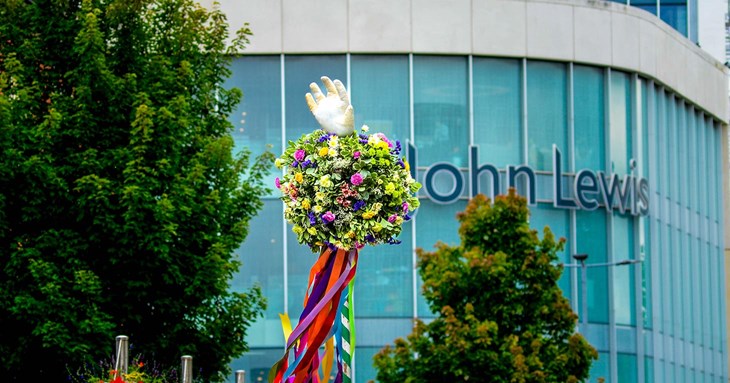Exeter's Lammas Fair: White Glove Parade Marks 900 Years of Tradition
Published: 30 June 2023

The quirky tradition of parading a big white glove through Exeter city centre returns next week (Thursday 6 July) with the Lammas Fair.
Lammas Fair sees colourful pageantry in the heart of Exeter culminating in the famous white glove being hoisted above Exeter’s historic Guildhall.
This year’s event gets underway at 11am, with the Lord Mayor's procession of the Lammas Glove, including civic dignitaries and Morris dancers departing from the Civic Centre.
The procession will travel down the High Street to the Guildhall, where the proclamation will be read and the Glove hoisted above the balcony, where it will be displayed for a period of three days.
After the reading of the proclamation the Lord Mayor, Cllr Kevin Mitchell will head over to the Cathedral Green where he will officially open this year’s Exeter Craft Festival, which runs from Thursday 6 to Saturday 8 July.
Exeter upholds the tradition of celebrating the Lammas Fair. The annual ceremony of the Proclamation of Lammas Fair dates back to before the Norman Conquest, more than 900 years ago.
The word Lammas derives from the Anglo-Saxon Hlafmaesse or Loaf Mass. Lammas Day, the festival of St Peter ad Vincula, was when the first fruits of the harvest were offered to the Church in the form of a loaf.
The franchise of a fair was a very valuable possession, giving exclusive right to tolls on all articles sold. The fair generally lasted for three days.
The Lammas Fair White Glove was displayed during the Fair and was a sign of Royal protection of the peace. The large leather, stuffed glove was attached to a long pole and was decorated with ribbons and a garland of flowers. Prior to the hoisting of the Glove, a Proclamation was made to declare the Fair open. The Proclamation was issued at the time of Edward III in 1330.
A Court known as the "Pie Powder Court" was appointed for every fair to deal with any complaint or other matter arising within the Fair.
Many towns in England still retain their ancient fairs but in most places the reading of the Proclamation and the hoisting of the Glove have been abandoned. Some of the fairs have survived chiefly as pleasure fairs, but most of them are purely agricultural.
During the 1860s, the last stalls disappeared from Exeter but the city was keen to uphold its ancient customs and has continued to proclaim the Fair and hoist the Glove as it has done for nine centuries.
